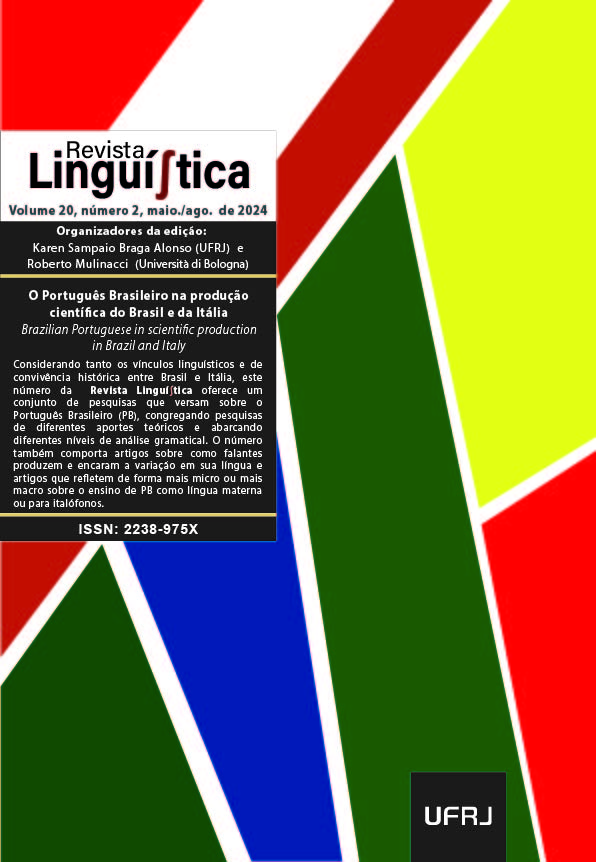A interação entre o segmento e suprassegmento: a (não)manutenção do r em fronteira de sintagma entoacional
DOI:
https://doi.org/10.31513/linguistica.2024.v20n2a64042Resumo
Este artigo trata da relação entre o apagamento variável do rótico em final de palavra, em não-verbos (senhoR ~ senho[Ø]), e a fronteira de sintagma entoacional (IP). Partindo da hipótese de que as fronteiras mais baixas na hierarquia prosódica – a de palavra prosódica (Pw) e de sintagma fonológico (PhP) –, favorecem a implementação do zero fonético e que a mais alta, de IP, tende a inibir a implementação do processo (Callou; Serra, 2012; Serra; Callou, 2013, 2015), esta análise focaliza a dinâmica entre a (não)manutenção do segmento e a incidência de marcas entoacionais e acústicas do contorno final de IP, como a presença de modulação melódica (acento tonal e tom de fronteira) na Pw mais à direita do constituinte e a ocorrência de pausa silenciosa. Para isso, norteiam este estudo os aportes teóricos da Fonologia Prosódica (Nespor; Vogel, 1986) e a abordagem Autossegmental e Métrica da Fonologia Entoacional (Pierrehumbert, 1980; Ladd, 2008). São analisados trechos de fala extraídos de entrevistas gravadas no município do Chuí, no Rio Grande do Sul, no âmbito do Projeto Atlas Linguístico do Brasil (ALiB). As 113 ocorrências do R em fronteira de IP foram editadas no programa Audacity (versão 2.0.5) e submetidos ao programa de análise acústica Praat (Boersma; Weenink, 2017). Os resultados reforçam a hipótese de que o domínio de IP tende a desfavorecer a implementação do apagamento da consoante, já que a manifestação do material textual é fundamental para a ancoragem dos tons que compõem a melodia principal da frase.
Palavras-chave: Rótico. Sintagma Entoacional. Projeto ALiB.
Downloads
Downloads
Publicado
Edição
Seção
Licença
Copyright (c) 2025 Revista Linguíʃtica

Este trabalho está licenciado sob uma licença Creative Commons Attribution-NonCommercial 4.0 International License.
Autores que publicam na Revista Linguí∫tica concordam com os seguintes termos:
Os autores mantêm os direitos e cedem à revista o direito à primeira publicação, simultaneamente submetido a uma licença Creative Commons que permite o compartilhamento por terceiros com a devida menção ao autor e à primeira publicação pela Revista Linguí∫tica.
Os autores podem entrar em acordos contratuais adicionais e separados para a distribuição não exclusiva da versão publicada da obra (por exemplo, postá-la em um repositório institucional ou publicá-la em um livro), com o reconhecimento de sua publicação inicial na Revista Linguí∫tica.

A Revista Linguí∫tica é uma revista do Programa de Pós-Graduação em Linguística da UFRJ e se utiliza da Licença Creative Commons - Atribuição-NãoComercial 4.0 Internacional (CC-BY-NC)









